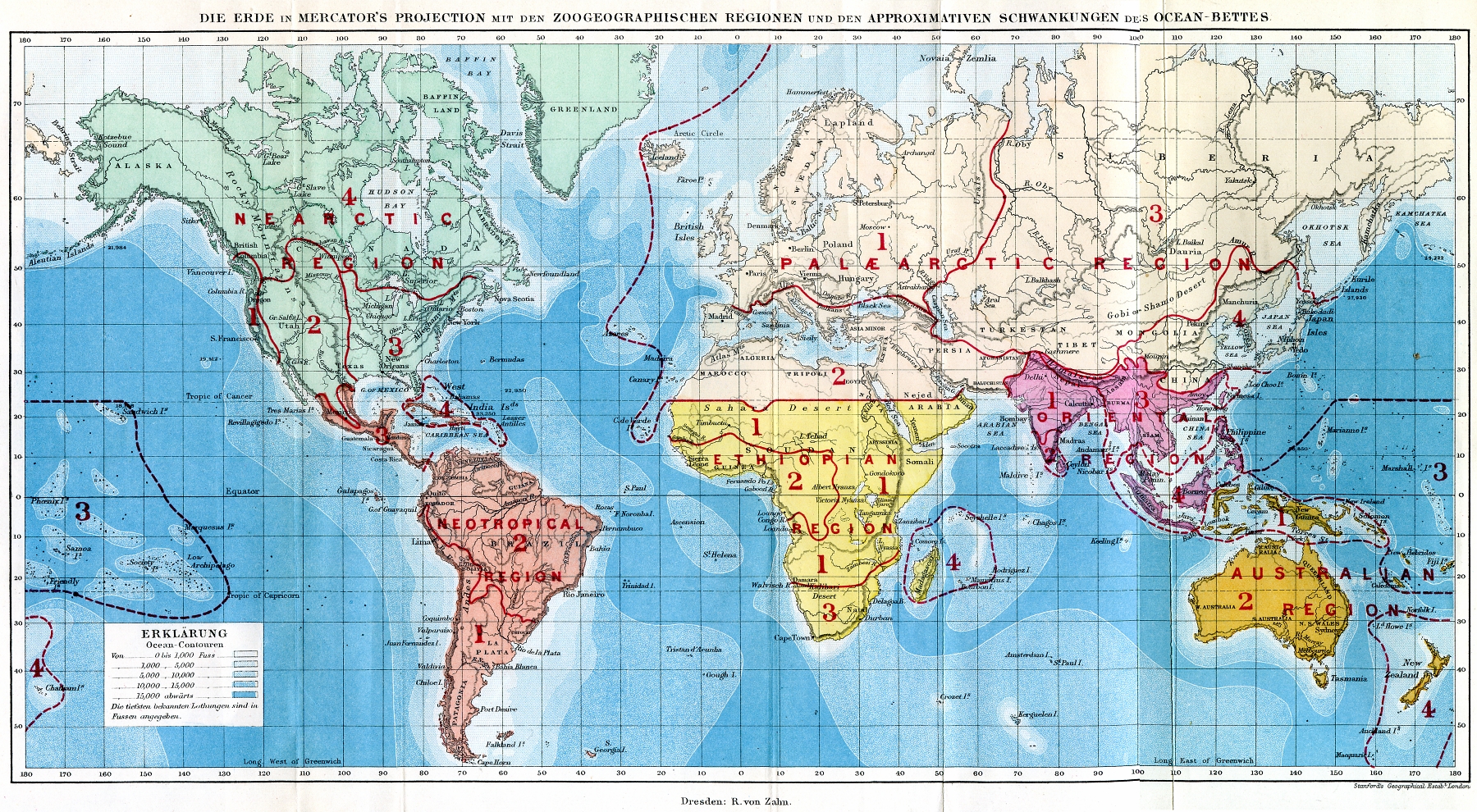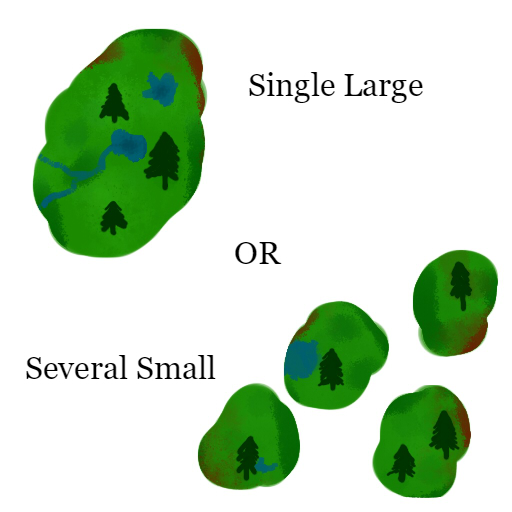|
The Theory Of Island Biogeography
''The Theory of Island Biogeography'' is a 1967 book by the ecologist Robert MacArthur and the biologist Edward O. Wilson. It is widely regarded as a seminal piece in island biogeography and ecology. The Princeton University Press reprinted the book in 2001 as a part of the "Princeton Landmarks in Biology" series. The book popularized the theory that insular biota maintain a dynamic equilibrium between immigration and extinction rates. The book also popularized the concepts and terminology of r/K selection theory. Background ''The Theory of Island Biogeography'' has its roots in Wilson's work on the ants of Melanesia. MacArthur synthesized Wilson's ideas about competition, colonization and equilibrium into a simple graphical representation of immigration and extinction curves, from which one can determine the equilibrial species number on an island. MacArthur and Wilson's ideas were first presented in a paper published in 1963, and were further developed into a book. Summary I ... [...More Info...] [...Related Items...] OR: [Wikipedia] [Google] [Baidu] |
Robert MacArthur
Robert Helmer MacArthur (April 7, 1930 – November 1, 1972) was a Canadian-born American ecologist who made a major impact on many areas of community and population ecology. Early life and education MacArthur was born in Toronto, Ontario, to John Wood MacArthur and Olive Turner in 1930. He later moved to Marlboro, Vermont, as his father moved from the University of Toronto to Marlboro College. MacArthur received his Bachelor's degree in mathematics from Marlboro College, followed by a Master's degree in mathematics from Brown University in 1953. A student of G. Evelyn Hutchinson, MacArthur earned his Ph.D. from Yale University in 1957; his thesis was on the division of ecological niches among five warbler species in the conifer forests of Maine and Vermont. From 1957 to 1958, MacArthur worked as a postdoc with David Lack. Career MacArthur was a professor at the University of Pennsylvania, 1958–65, and professor of biology at Princeton University, 1965-72. He played an ... [...More Info...] [...Related Items...] OR: [Wikipedia] [Google] [Baidu] |
Daniel Simberloff
Daniel Simberloff is a biologist and ecologist who earned his Ph.D. from Harvard University in 1969. He is currently Gore Hunger Professor of Environmental Science at the University of Tennessee, editor-in-chief of the journal ''Biological Invasions'', and a member of the National Academy of Sciences. Early life and education Simberloff was born in 1942 in Wilson Borough, Pennsylvania. As a young child, he collected insects, especially beetles, pinning and preserving them in cigar boxes as early as four years old. In addition to his collection of insects, Simberloff also caught and kept salamanders and musk turtles in a basin in his home. He cites being influenced by his uncle, who was a chemist. Consequently, he received science books and was taken to science lectures throughout his youth. He moved to New York City at age 11. Simberloff received his Bachelor of Arts from Harvard College in 1964, and his Ph.D. in Biology from Harvard University in 1969. He wanted to go to gra ... [...More Info...] [...Related Items...] OR: [Wikipedia] [Google] [Baidu] |
Books By Robert H
A book is a medium for recording information in the form of writing or images, typically composed of many pages (made of papyrus, parchment, vellum, or paper) bound together and protected by a cover. The technical term for this physical arrangement is ''codex'' (plural, ''codices''). In the history of hand-held physical supports for extended written compositions or records, the codex replaces its predecessor, the scroll. A single sheet in a codex is a leaf and each side of a leaf is a page. As an intellectual object, a book is prototypically a composition of such great length that it takes a considerable investment of time to compose and still considered as an investment of time to read. In a restricted sense, a book is a self-sufficient section or part of a longer composition, a usage reflecting that, in antiquity, long works had to be written on several scrolls and each scroll had to be identified by the book it contained. Each part of Aristotle's ''Physics'' is called a bo ... [...More Info...] [...Related Items...] OR: [Wikipedia] [Google] [Baidu] |
Biogeography
Biogeography is the study of the distribution of species and ecosystems in geographic space and through geological time. Organisms and biological communities often vary in a regular fashion along geographic gradients of latitude, elevation, isolation and habitat area.Brown University, "Biogeography." Accessed February 24, 2014. . Phytogeography is the branch of biogeography that studies the distribution of plants. Zoogeography is the branch that studies distribution of animals. Mycogeography is the branch that studies distribution of fungi, such as mushrooms. Knowledge of spatial variation in the numbers and types of organisms is as vital to us today as it was to our early human ancestors, as we adapt to heterogeneous but geographically predictable environments. Biogeography is an integrative field of inquiry that unites concepts and information from ecology, evolutionary biology, taxonomy, geology, physical geography, palaeontology, and climatology.Dansereau, Pierre. 1957 ... [...More Info...] [...Related Items...] OR: [Wikipedia] [Google] [Baidu] |
American Non-fiction Books
American(s) may refer to: * American, something of, from, or related to the United States of America, commonly known as the "United States" or "America" ** Americans, citizens and nationals of the United States of America ** American ancestry, people who self-identify their ancestry as "American" ** American English, the set of varieties of the English language native to the United States ** Native Americans in the United States, indigenous peoples of the United States * American, something of, from, or related to the Americas, also known as "America" ** Indigenous peoples of the Americas * American (word), for analysis and history of the meanings in various contexts Organizations * American Airlines, U.S.-based airline headquartered in Fort Worth, Texas * American Athletic Conference, an American college athletic conference * American Recordings (record label), a record label previously known as Def American * American University, in Washington, D.C. Sports teams Soccer * ... [...More Info...] [...Related Items...] OR: [Wikipedia] [Google] [Baidu] |
1967 Non-fiction Books
Events January * January 1 – Canada begins a year-long celebration of the 100th anniversary of Confederation, featuring the Expo 67 World's Fair. * January 5 ** Spain and Romania sign an agreement in Paris, establishing full consular and commercial relations (not diplomatic ones). ** Charlie Chaplin launches his last film, ''A Countess from Hong Kong'', in the UK. * January 6 – Vietnam War: USMC and ARVN troops launch ''Operation Deckhouse Five'' in the Mekong Delta. * January 8 – Vietnam War: Operation Cedar Falls starts. * January 13 – A military coup occurs in Togo under the leadership of Étienne Eyadema. * January 14 – The Human Be-In takes place in Golden Gate Park, San Francisco; the event sets the stage for the Summer of Love. * January 15 ** Louis Leakey announces the discovery of pre-human fossils in Kenya; he names the species '' Kenyapithecus africanus''. ** American football: The Green Bay Packers defeat the Kansas City Chiefs 35–10 in the First AF ... [...More Info...] [...Related Items...] OR: [Wikipedia] [Google] [Baidu] |
Unified Neutral Theory Of Biodiversity
The unified neutral theory of biodiversity and biogeography (here "Unified Theory" or "UNTB") is a theory and the title of a monograph by ecologist Stephen P. Hubbell. It aims to explain the diversity and relative abundance of species in ecological communities. Like other neutral theories of ecology, Hubbell assumes that the differences between members of an ecological community of trophically similar species are "neutral", or irrelevant to their success. This implies that niche differences do not influence abundance and the abundance of each species follows a random walk. The theory has sparked controversy, and some authors consider it a more complex version of other null models that fit the data better. "Neutrality" means that at a given trophic level in a food web, species are equivalent in birth rates, death rates, dispersal rates and speciation rates, when measured on a per-capita basis. This can be considered a null hypothesis to niche theory. Hubbell built on earlier ... [...More Info...] [...Related Items...] OR: [Wikipedia] [Google] [Baidu] |
Conservation Biology
Conservation biology is the study of the conservation of nature and of Earth's biodiversity with the aim of protecting species, their habitats, and ecosystems from excessive rates of extinction and the erosion of biotic interactions. It is an interdisciplinary subject drawing on natural and social sciences, and the practice of natural resource management. The conservation ethic is based on the findings of conservation biology. Origins The term conservation biology and its conception as a new field originated with the convening of "The First International Conference on Research in Conservation Biology" held at the University of California, San Diego in La Jolla, California, in 1978 led by American biologists Bruce A. Wilcox and Michael E. Soulé with a group of leading university and zoo researchers and conservationists including Kurt Benirschke, Sir Otto Frankel, Thomas Lovejoy, and Jared Diamond. The meeting was prompted due to concern over tropical deforestation, disappearin ... [...More Info...] [...Related Items...] OR: [Wikipedia] [Google] [Baidu] |
Landscape Ecology
Landscape ecology is the science of studying and improving relationships between ecological processes in the environment and particular ecosystems. This is done within a variety of landscape scales, development spatial patterns, and organizational levels of research and policy. Concisely, landscape ecology can be described as the science of "landscape diversity" as the synergetic result of biodiversity and geodiversity. As a highly interdisciplinary field in systems science, landscape ecology integrates biophysical and analytical approaches with humanistic and holistic perspectives across the natural sciences and social sciences. Landscapes are spatially heterogeneous geographic areas characterized by diverse interacting patches or ecosystems, ranging from relatively natural terrestrial and aquatic systems such as forests, grasslands, and lakes to human-dominated environments including agricultural and urban settings. The most salient characteristics of landscape ecology a ... [...More Info...] [...Related Items...] OR: [Wikipedia] [Google] [Baidu] |
SLOSS Debate
The SLOSS debate was a debate in ecology and conservation biology during the 1970's and 1980's as to whether a single large or several small (SLOSS) reserves were a superior means of conserving biodiversity in a habitat fragmentation, fragmented habitat. Since its inception, multiple alternate theories have been proposed. There have been applications of the concept outside of the original context of habitat conservation. History In 1975, Jared Diamond suggested some "rules" for the design of protected areas, based on Robert MacArthur and E. O. Wilson's book ''The Theory of Island Biogeography''. One of his suggestions was that a single large reserve was preferable to several smaller reserves whose total areas were equal to the larger. Since species richness increases with habitat (ecology), habitat area, as established by the Species–area relationship, species area curve, a larger block of habitat would support more species than any of the smaller blocks. This idea was popula ... [...More Info...] [...Related Items...] OR: [Wikipedia] [Google] [Baidu] |
Habitat Fragmentation
Habitat fragmentation describes the emergence of discontinuities (fragmentation) in an organism's preferred environment (habitat), causing population fragmentation and ecosystem decay. Causes of habitat fragmentation include geological processes that slowly alter the layout of the physical environment (suspected of being one of the major causes of speciation), and human activity such as land conversion, which can alter the environment much faster and causes the extinction of many species. More specifically, habitat fragmentation is a process by which large and contiguous habitats get divided into smaller, isolated patches of habitats. Definition The term habitat fragmentation includes five discrete phenomena: * Reduction in the total area of the habitat * Decrease of the interior: edge ratio * Isolation of one habitat fragment from other areas of habitat * Breaking up of one patch of habitat into several smaller patches * Decrease in the average size of each patch of habitat ... [...More Info...] [...Related Items...] OR: [Wikipedia] [Google] [Baidu] |
Conservation Biology
Conservation biology is the study of the conservation of nature and of Earth's biodiversity with the aim of protecting species, their habitats, and ecosystems from excessive rates of extinction and the erosion of biotic interactions. It is an interdisciplinary subject drawing on natural and social sciences, and the practice of natural resource management. The conservation ethic is based on the findings of conservation biology. Origins The term conservation biology and its conception as a new field originated with the convening of "The First International Conference on Research in Conservation Biology" held at the University of California, San Diego in La Jolla, California, in 1978 led by American biologists Bruce A. Wilcox and Michael E. Soulé with a group of leading university and zoo researchers and conservationists including Kurt Benirschke, Sir Otto Frankel, Thomas Lovejoy, and Jared Diamond. The meeting was prompted due to concern over tropical deforestation, disappearin ... [...More Info...] [...Related Items...] OR: [Wikipedia] [Google] [Baidu] |






